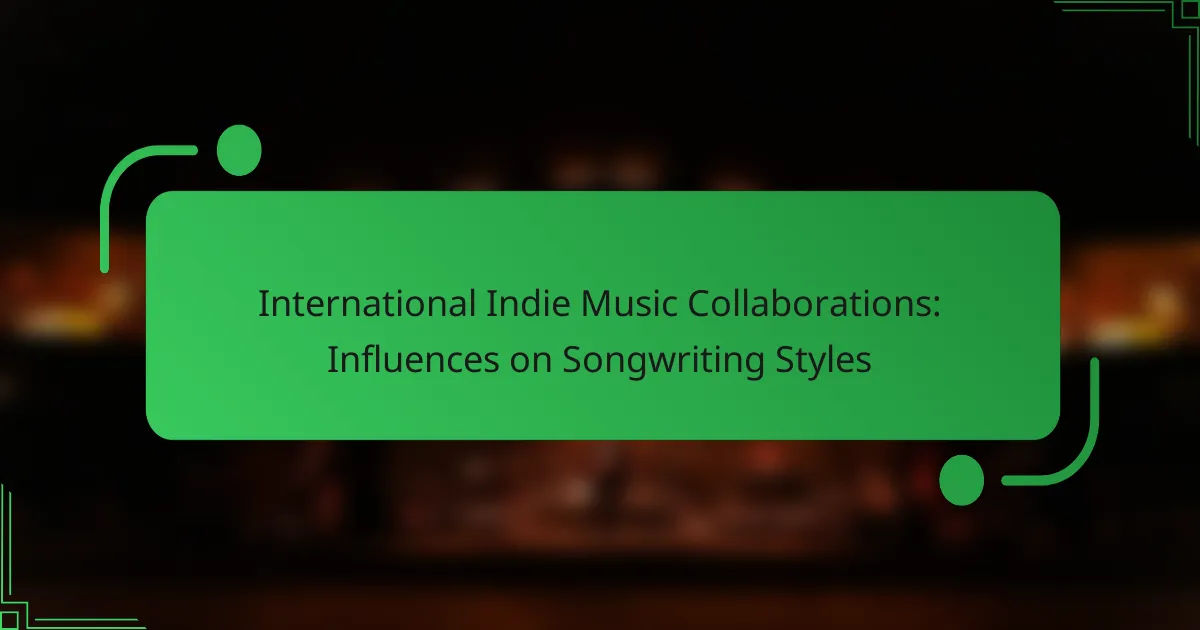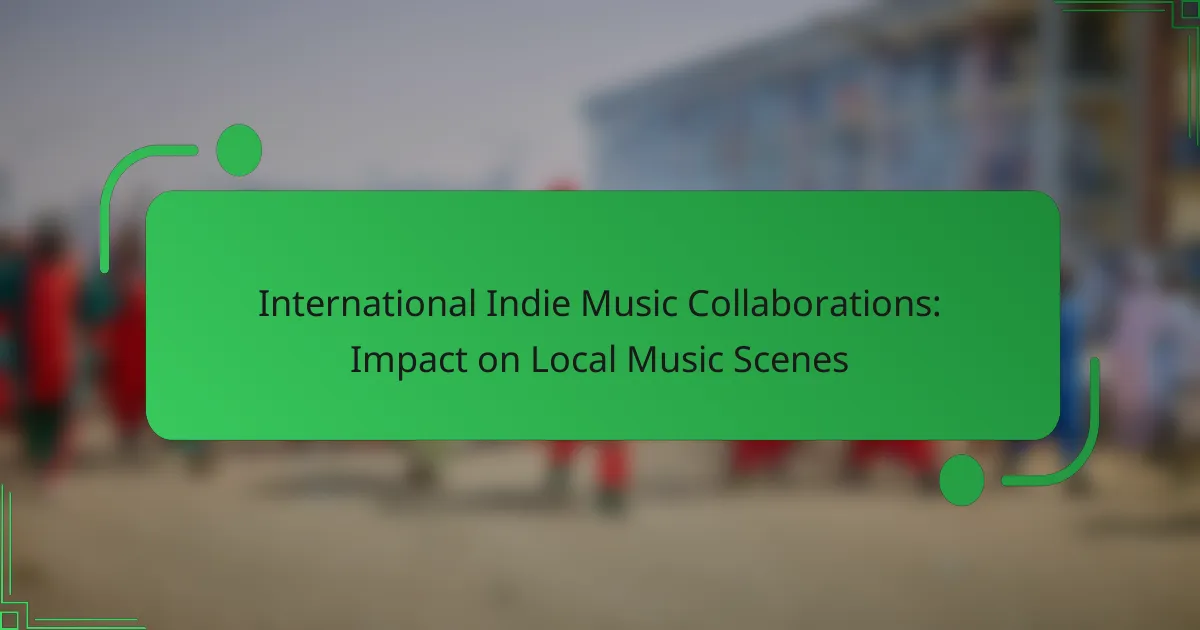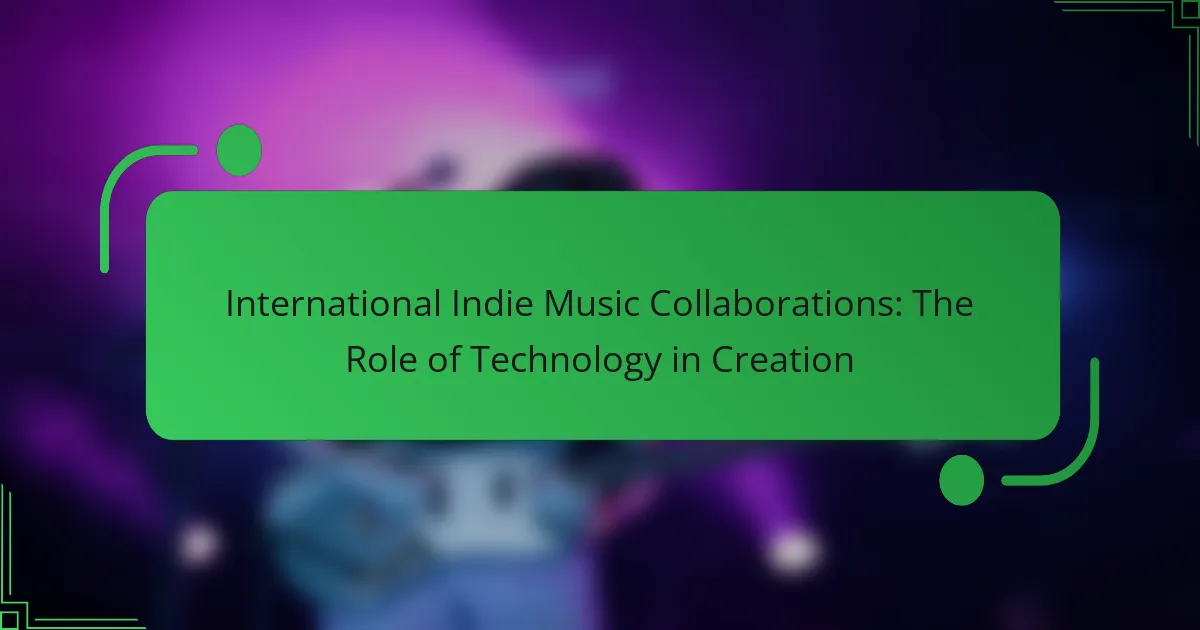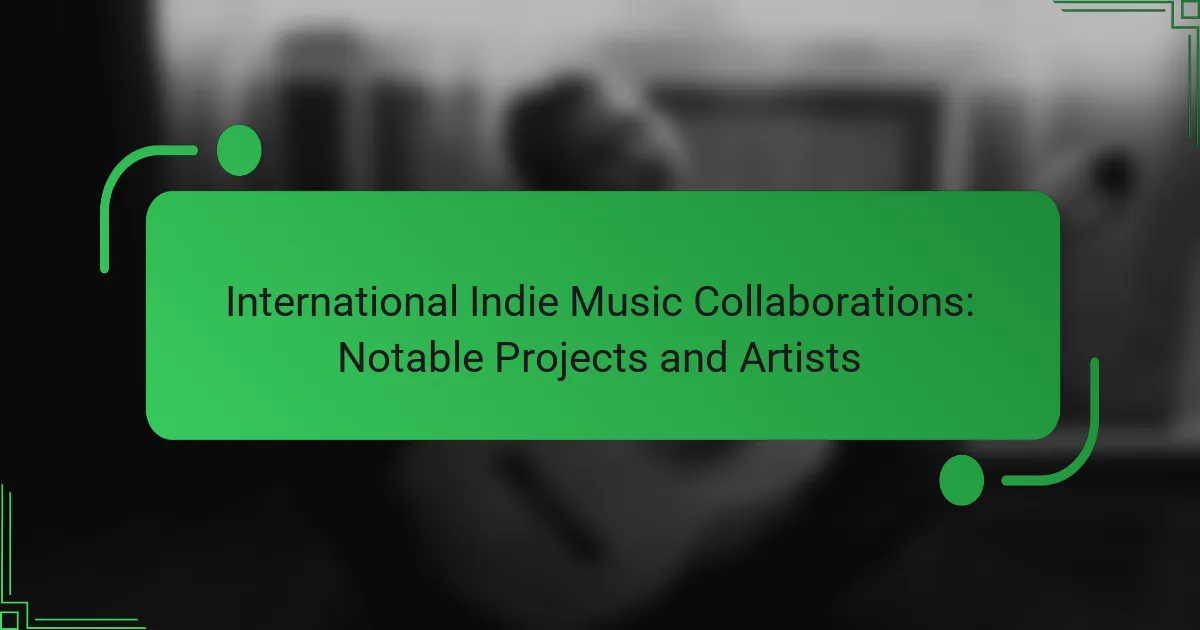International indie music collaborations provide valuable educational opportunities and workshops that enhance artistic skills. These initiatives foster cross-cultural exchange, mentorship from experienced artists, and innovative production methods. Artists can navigate challenges such as cultural differences and communication barriers while establishing productive partnerships. Festivals and online platforms further facilitate networking and collaboration, enriching the global indie music scene.
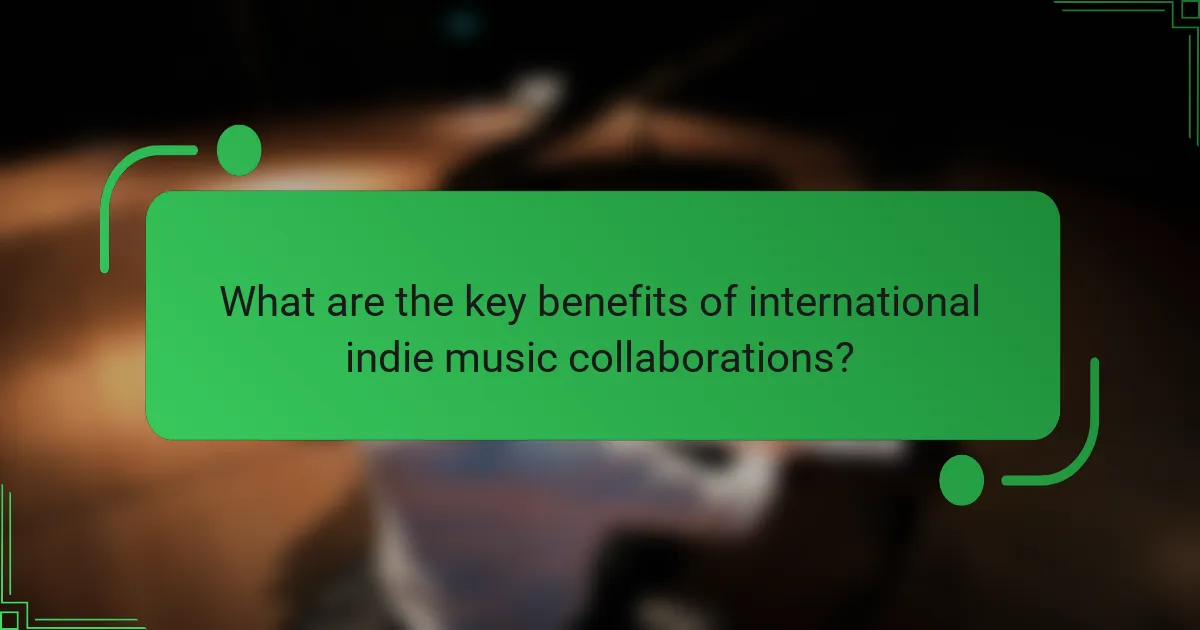
What are the key benefits of international indie music collaborations?
International indie music collaborations offer numerous educational opportunities and workshops that enhance skills and knowledge. Participants gain exposure to diverse musical styles, fostering creativity and innovation. Collaborations often include mentorship from experienced artists, providing valuable insights into the industry. Additionally, these partnerships can create networking opportunities, leading to future projects and collaborations. Overall, the cross-cultural exchange enriches the artistic experience, promoting growth and development in the indie music scene.
How do collaborations enhance creativity and innovation?
Collaborations enhance creativity and innovation by combining diverse perspectives and skills. International indie music collaborations offer unique educational opportunities and workshops that foster artistic growth. Participants gain exposure to various cultural influences, which can lead to novel ideas and approaches. For example, workshops often emphasize collaborative songwriting techniques, enabling artists to merge different musical styles. This cross-pollination of ideas can result in innovative soundscapes that challenge traditional norms.
What networking opportunities arise from these collaborations?
International indie music collaborations create diverse networking opportunities through workshops and educational events. These collaborations enable artists to connect with industry professionals, share knowledge, and develop their skills. Participants can gain insights into different music styles and production techniques while expanding their global network. Additionally, these interactions often lead to future projects and partnerships, enhancing career prospects in the music industry.
Which skills can artists develop through collaborative projects?
Artists can develop various skills through collaborative projects, including communication, teamwork, and adaptability. These projects enhance creativity by exposing artists to diverse perspectives. Additionally, they foster networking opportunities, allowing artists to connect with peers and industry professionals. Collaborative experiences can also improve technical skills by encouraging artists to learn from each other’s techniques and approaches.
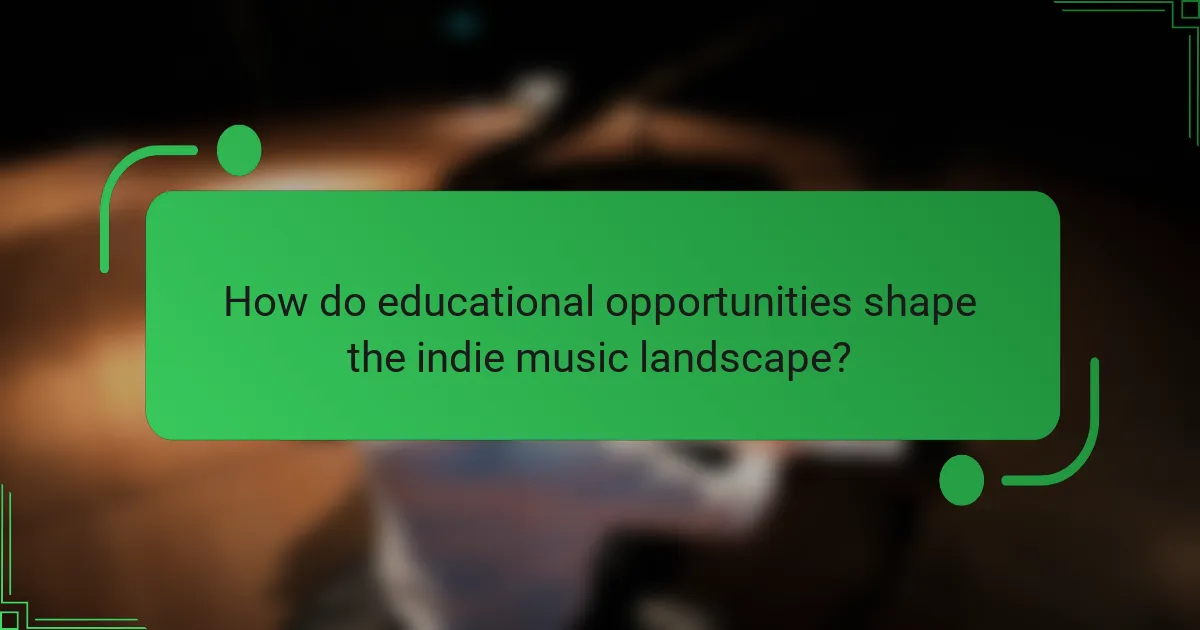
How do educational opportunities shape the indie music landscape?
Educational opportunities significantly enhance the indie music landscape by fostering collaboration and skill development. Workshops and programs connect artists from diverse backgrounds, enabling the exchange of ideas and techniques. These initiatives often focus on unique attributes, such as genre fusion and innovative production methods, which enrich the indie music scene. As a result, artists gain exposure to global influences, leading to a more vibrant and varied musical output.
What types of workshops are commonly available for indie musicians?
Indie musicians can access various workshops that enhance their skills and knowledge. Common types include songwriting workshops, music production sessions, marketing and branding seminars, performance masterclasses, and collaboration-focused events. These workshops often feature industry professionals as instructors, providing valuable insights and networking opportunities.
How do online platforms facilitate learning and collaboration?
Online platforms enhance learning and collaboration in international indie music by providing accessible workshops and networking opportunities. These platforms connect musicians from diverse backgrounds, allowing them to share skills and knowledge. Collaborative projects often lead to unique educational experiences, fostering creativity and innovation. Additionally, online resources offer tutorials and feedback, enabling artists to refine their craft and expand their reach.
Which institutions offer specialized programs for indie artists?
Several institutions offer specialized programs for indie artists, focusing on collaboration and education. Notable examples include Berklee College of Music, which provides courses on music production and songwriting; the School of Audio Engineering (SAE), offering hands-on workshops in music technology; and the University of Southern California’s Thornton School of Music, which emphasizes contemporary music and industry practices. Each institution tailors its programs to foster creativity and collaboration among independent musicians.
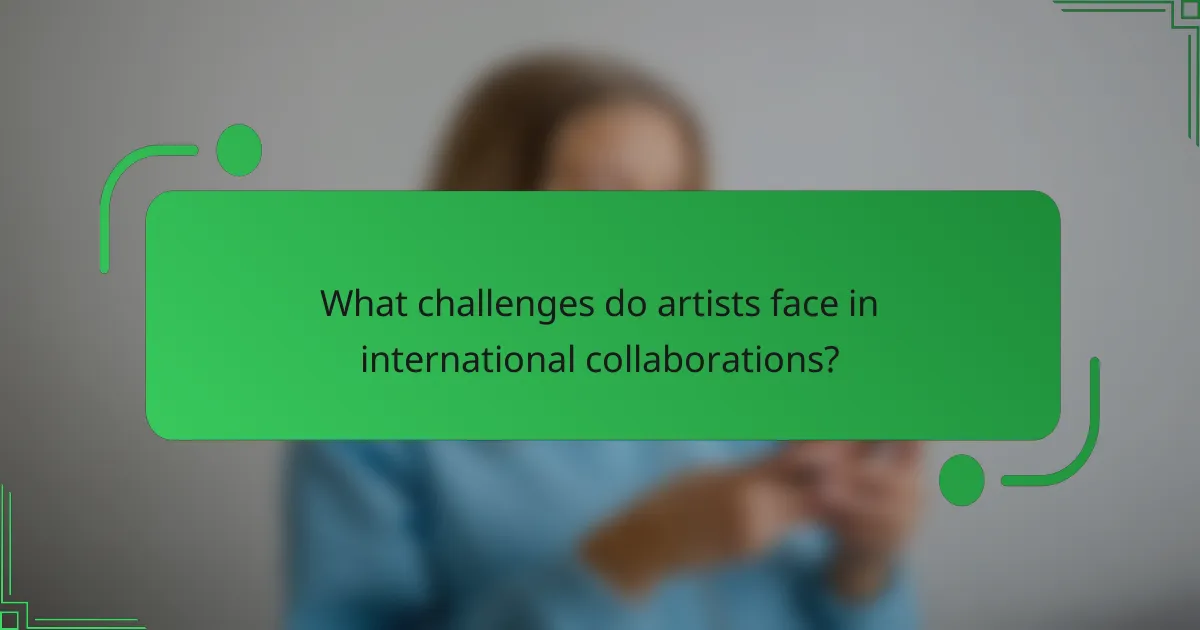
What challenges do artists face in international collaborations?
Artists face several challenges in international collaborations, including cultural differences, communication barriers, and logistical issues. These factors can hinder creative processes and project execution. Cultural differences may lead to misunderstandings regarding artistic intent and expression. Communication barriers often stem from language differences, complicating collaboration. Logistical issues, such as time zone discrepancies and resource allocation, can impede project timelines. Addressing these challenges requires effective planning and open dialogue.
How do cultural differences impact collaborative efforts?
Cultural differences significantly impact collaborative efforts in international indie music projects. These differences shape communication styles, creative processes, and expectations, influencing how artists work together.
Understanding cultural nuances fosters respect and enhances collaboration. For example, diverse musical traditions can inspire innovative soundscapes, while varying approaches to feedback can lead to richer artistic exchanges.
Workshops that focus on cultural awareness can bridge gaps, providing educational opportunities that enhance collaboration. Participants learn to appreciate each other’s backgrounds, leading to more effective teamwork and creative synergy.
Ultimately, recognizing and valuing cultural differences not only enriches the collaborative experience but also broadens the artistic horizons of all involved.
What logistical issues can arise during cross-border projects?
Logistical issues in cross-border projects include communication barriers, differing regulations, and currency fluctuations. These factors can hinder collaboration and project success. Additionally, time zone differences may complicate scheduling. Effective planning and local partnerships can mitigate these challenges.
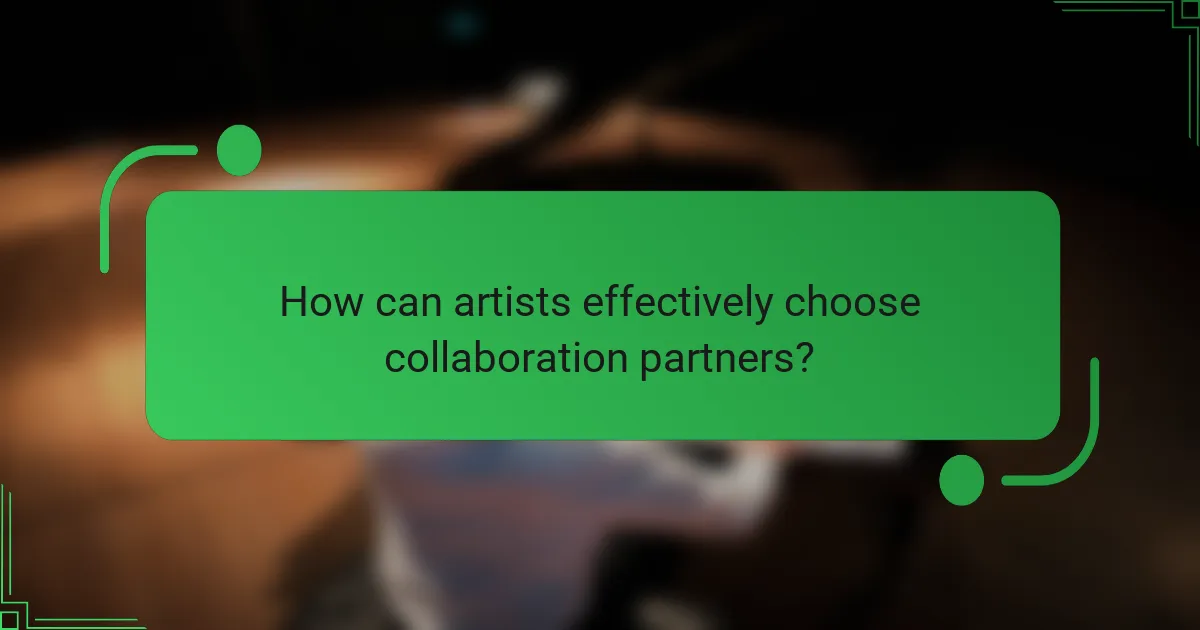
How can artists effectively choose collaboration partners?
Artists can effectively choose collaboration partners by assessing shared goals, complementary skills, and mutual respect. Identifying partners with similar artistic visions enhances creativity and project success. Researching potential collaborators through networking events, workshops, or online platforms broadens opportunities. Engaging in educational workshops on collaboration techniques equips artists with essential skills to navigate partnerships. Establishing clear communication and setting expectations early fosters a productive working relationship.
What criteria should be considered when selecting collaborators?
Consider experience, artistic vision, communication skills, cultural understanding, and mutual goals when selecting collaborators. These criteria ensure effective partnerships in international indie music collaborations. Evaluating these attributes helps identify suitable educational opportunities and workshops that align with creative aspirations.
How do genre and style influence collaboration dynamics?
Genre and style significantly shape collaboration dynamics in international indie music. They determine creative approaches, communication methods, and the overall synergy of artists involved. Diverse genres foster unique perspectives, enhancing innovation. For example, blending folk with electronic elements can lead to unexpected sounds, enriching the collaborative process. Additionally, stylistic differences can create challenges in aligning vision and execution, requiring effective negotiation and compromise. Understanding these influences is vital for successful collaborations in educational settings and workshops.
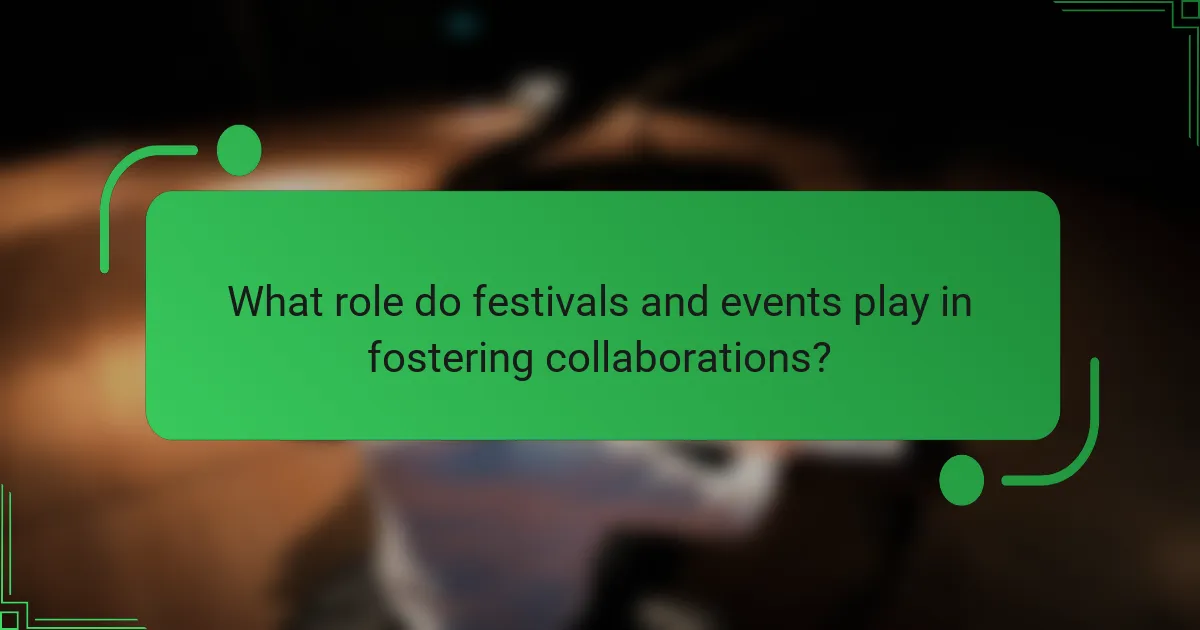
What role do festivals and events play in fostering collaborations?
Festivals and events significantly enhance international indie music collaborations by providing networking platforms. They facilitate connections among artists, educators, and industry professionals, fostering creative partnerships. Workshops at these gatherings offer educational opportunities that deepen skills and knowledge in music production and performance. Collaborations formed during these events often lead to innovative projects, enriching the global indie music scene.
Which international festivals are known for promoting indie music collaborations?
Several international festivals promote indie music collaborations, including South by Southwest (SXSW), Primavera Sound, and the Great Escape. These events offer educational opportunities and workshops for artists to connect and innovate.
SXSW, held in Austin, Texas, features panels and sessions focused on collaboration. Primavera Sound, based in Barcelona, emphasizes diverse musical styles and networking. The Great Escape in Brighton, UK, showcases emerging talent and provides workshops that encourage collaboration among indie musicians.
These festivals not only highlight unique indie music but also foster community and creativity, making them essential for artists seeking collaboration.
How can artists leverage these events for networking?
Artists can leverage international indie music collaborations for networking by actively participating in workshops and educational events. These gatherings provide opportunities to connect with like-minded individuals, industry professionals, and potential collaborators. Engaging in discussions and sharing experiences can lead to valuable partnerships and exposure to diverse musical styles. Additionally, attending these events often results in access to resources and mentorship that can enhance an artist’s skills and visibility in the music community.
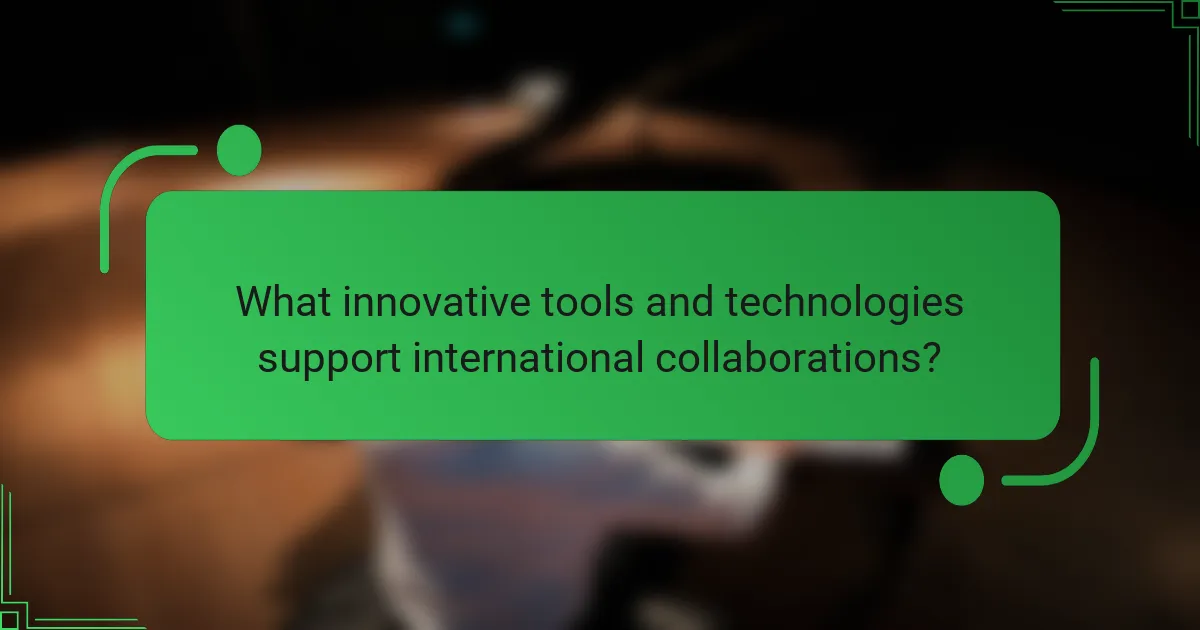
What innovative tools and technologies support international collaborations?
Innovative tools and technologies enhance international indie music collaborations through online platforms, virtual reality, and collaborative software. These resources facilitate real-time communication, creative sharing, and educational workshops. For example, platforms like Soundtrap enable musicians to record and collaborate remotely, breaking geographical barriers. Virtual reality tools offer immersive experiences for workshops, allowing participants to engage in a shared creative space. Additionally, project management software streamlines collaboration, ensuring efficient coordination among diverse teams. These advancements foster a global exchange of ideas and talents in the indie music scene.
How do music production software and platforms enhance collaboration?
Music production software and platforms significantly enhance collaboration by providing tools that facilitate real-time communication and feedback. These platforms enable musicians from different locations to work together seamlessly, share files, and edit tracks concurrently.
For instance, cloud-based software allows artists to upload and share their work, making it accessible for others to contribute. This accessibility fosters creativity and innovation, leading to unique musical outcomes. Additionally, features like integrated chat and video conferencing support direct interaction, which can improve project outcomes and strengthen partnerships.
Workshops and educational opportunities often utilize these platforms to teach collaborative techniques, showcasing how technology can bridge geographical barriers. This approach not only enhances the learning experience but also prepares participants for the evolving landscape of music production.
What are the emerging trends in digital collaboration tools?
Emerging trends in digital collaboration tools focus on enhancing creativity and accessibility for international indie music collaborations. Tools now integrate real-time editing, cloud storage, and AI-driven features to streamline the creative process. Workshops increasingly utilize platforms that support video conferencing and interactive learning, fostering global networking. Additionally, there is a growing emphasis on user-friendly interfaces, making these tools more accessible to diverse skill levels.
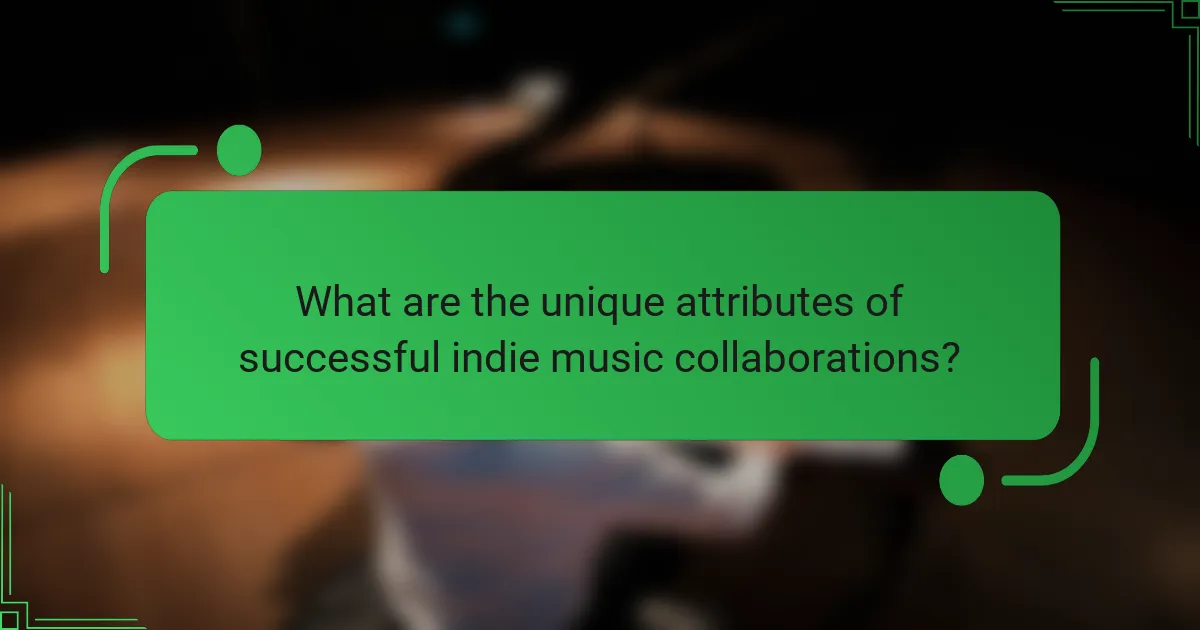
What are the unique attributes of successful indie music collaborations?
Successful indie music collaborations often feature distinct attributes that enhance creativity and learning. These include diverse musical styles, shared resources, and cross-cultural perspectives. Collaborative workshops provide unique opportunities for skill development, networking, and exposure to different artistic approaches. Engaging in these collaborations fosters innovation and can lead to the creation of unique soundscapes that resonate with wider audiences.
How do personal artistic visions align in successful projects?
Personal artistic visions align in successful projects through collaboration, communication, and shared goals. These elements foster creativity and innovation in international indie music collaborations. Workshops and educational opportunities enhance these alignments by providing structured environments for artists to exchange ideas and techniques. As a result, diverse perspectives merge, enriching the artistic process and leading to unique musical outcomes.
What are the common traits of effective collaborative teams?
Effective collaborative teams share traits such as open communication, mutual respect, and a clear vision. These attributes foster creativity and enhance problem-solving. Strong leadership drives accountability, while diverse skills contribute to innovative solutions. Regular feedback and adaptability are essential for continuous improvement.
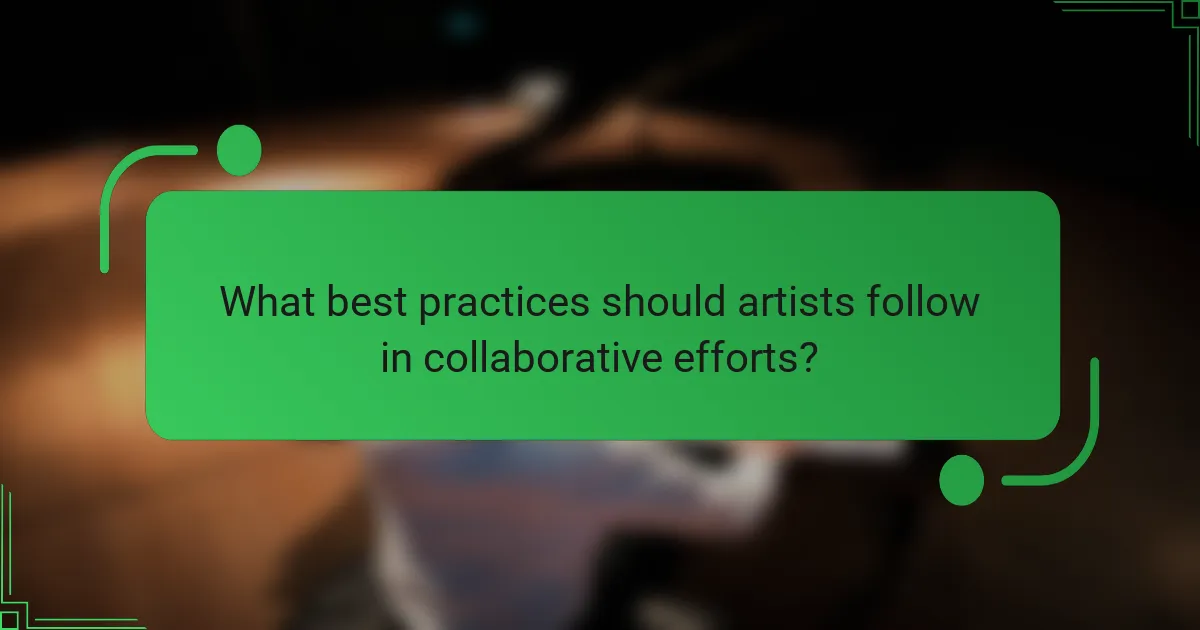
What best practices should artists follow in collaborative efforts?
Artists should prioritize clear communication, mutual respect, and open-mindedness in collaborative efforts. Establishing shared goals enhances creativity and cohesion. Regular feedback sessions foster growth and alignment. Engaging in workshops can provide valuable skills and networking opportunities, enriching the collaborative experience. Embracing diverse perspectives can lead to innovative outcomes.
How can clear communication enhance collaboration outcomes?
Clear communication significantly enhances collaboration outcomes by fostering mutual understanding and trust among participants. It ensures that all members are aligned on goals, expectations, and responsibilities, which is crucial in international indie music collaborations. Effective communication reduces misunderstandings, leading to more productive workshops and educational opportunities. As a result, artists can share their unique perspectives and skills, enriching the collaborative process. Additionally, clear dialogue encourages feedback and creativity, vital for innovative musical expressions.
What strategies can artists employ to manage creative differences?
Artists can manage creative differences by fostering open communication and establishing clear goals. They should prioritize collaboration through regular feedback sessions, allowing each member to express their ideas. Setting ground rules for decision-making can help resolve conflicts effectively. Additionally, participating in workshops focused on collaboration skills can enhance understanding and creativity within the group.
What common mistakes should be avoided in collaborative projects?
To avoid common mistakes in international indie music collaborations, prioritize clear communication and defined roles. Misunderstandings can arise from vague expectations, leading to conflicts. Additionally, neglecting cultural differences may hinder collaboration effectiveness. Lastly, failing to establish a timeline can result in missed deadlines and project delays.
